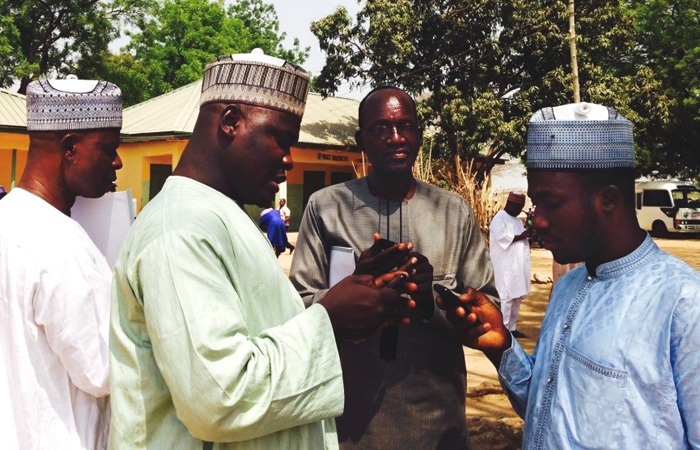Android Phone Data Collection for an Updated Nigeria MDG Information System
Angelique Mahal describes the importance of data driven planning and the process of training users on mobile phone data collection. The trainings marked the start of a mop-up survey effort for our Nigeria Scale Up initiative. Angelique Mahal is a member of the Center on Globalization and Sustainable Development, a collaborator of SEL on the project. This blog was cross posted on cgsd.columbia.edu.
Building a culture around the use of data — including collecting, validating, and presenting it numerically and visually — provides an efficient foundation to establish a data-driven planning process applicable to proposal development, program implementation, program analysis, and resource allocation. The process of data collection, validation, and presentation needs to be implemented with strict standards to ensure validity. In early February 2014 in Abuja, Nigeria, a two-day training on “data mop-up” was held by the Office of the Senior Special Assistant to the President of Nigeria on the Millennium Development Goals (OSSAP-MDGs) and The Earth Institute. The purpose of this training was to provide initial guidance to Zonal Technical Officers and Technical Assistants on data collection from facilities not included in the 2012 baseline facility inventory conducted as part of the Nigeria Scale up Project. It is anticipated an additional 60,000-100,000 facilities will be surveyed through this effort. Technical Assistants are hired by OSSAP-MDGs to develop community development projects in their assigned local government area(s) and six Zonal Technical Officers oversee all Technical Assistants for their respective zone.
The training included instruction on how to conduct the mop-up survey. For example, it included review of data collection at education and health facilities with the use of Android phones, roles and responsibilities of data collectors, a question & answer session, and an on-the-ground practical data collection exercise at actual school and health facilities using Android phones. The mop-up surveys were designed to collect basic information, including tagging education or health facilities; assessing water, sanitation, and power capacities; photo documentation; and observations of major repairs. The mop-up surveys were developed by The Earth Institute and were vetted by the Education and Health Desk Officers at OSSAP-MDGs, who also participated in the mop-up training.
Overall the training was completed successfully. The practical field experience gave the data collectors an opportunity to practice questioning a facility administrator, using the survey on the Android phones, capturing GPS coordinates, and taking photographs. Going through this process, they identified points of discussion on how to answer questions for certain conditions observed at the facility. Discussion occurred in plenary after returning from the fieldwork exercise. Beyond the data collection, the practical exercise highlighted adjustments to be considered for the survey. The mop-up exercise will continue into March 2014 along with a process of data validation.
Where will this data be placed and how will it be used? The data will be part of a newly updated Nigeria MDG Information System (NMIS), which currently contains existing data from over 60% of education and health facilities in Nigeria and will be able to expand its coverage with finalized mop-up data. NMIS is an online data portal of education, health, and water facilities across Nigeria. Data is represented at the national, local government, and individual facility level from different data sources. Indicators are grouped by topic and can be viewed for each facility. Progress towards MDGs at the local government and national level are posted. Beyond numeric and indicator display, features include visualizations of maps, pictures, tables, and split-screen views. Data in NMIS is used by Technical Assistants in planning interventions and developing proposals. The data provides evidence and support for the requested interventions in combination with community assessments and input.
Following this initial training the Zonal Technical Officers and Technical Assistants who attended returned to their local government areas throughout Nigeria to implement the pilot survey. OSSAP-MDGs and The Earth Institute will support them as the pilot is underway throughout the next several weeks.



